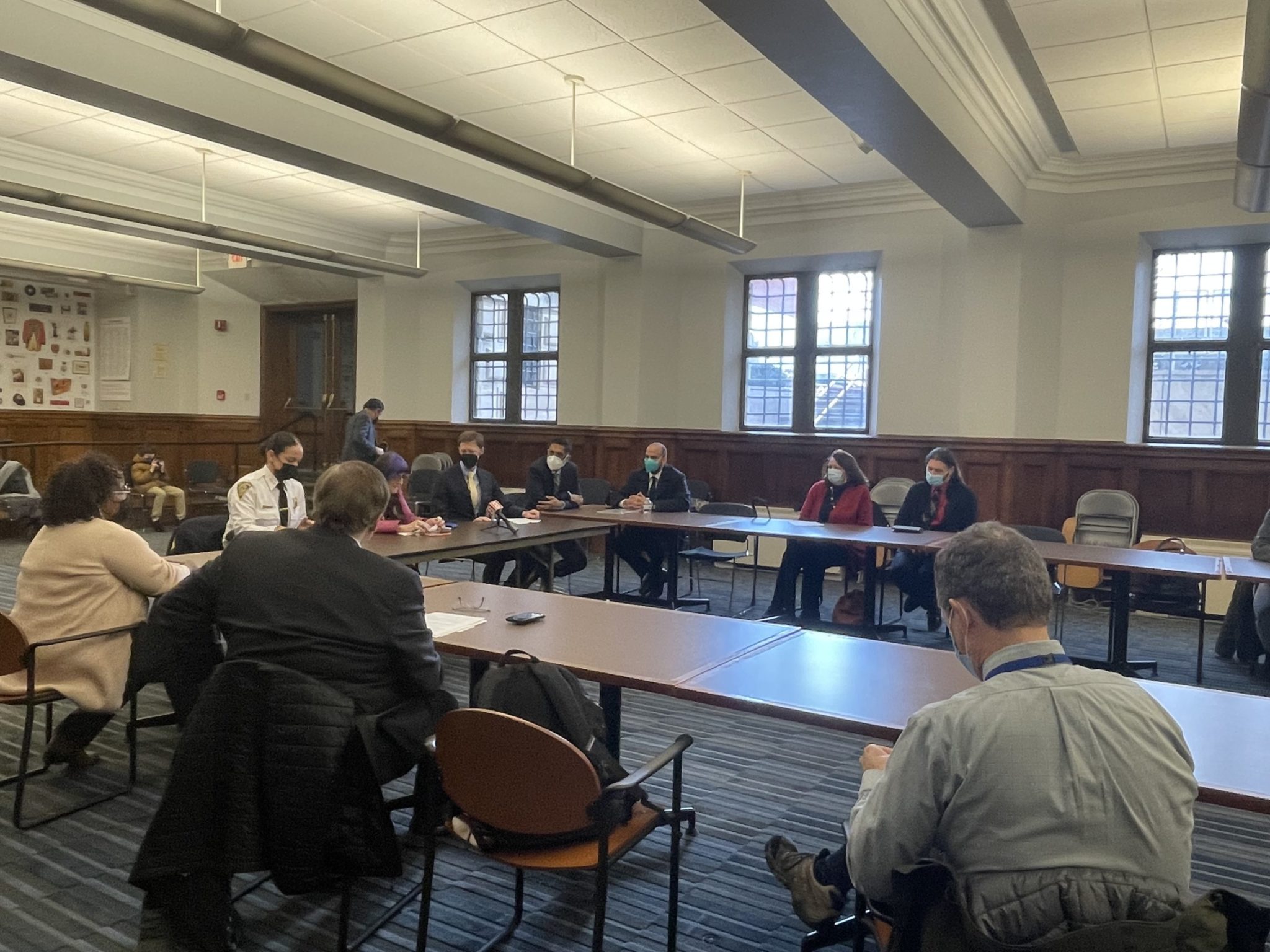New Haven receives $2 million for Community Crisis Response Team
The city held a roundtable discussion on Monday morning on how to integrate the Crisis Response Team into the current 911 and non-emergency dispatch system.

Hannah Qu, Contributing Photographer
In an hour-long round table discussion on Monday morning, city and community leaders discussed the integration of the city’s Community Crisis Response Team into the existing 911 non-emergency dispatch system and human services network within the Greater New Haven area.
Funded by a $2 million grant introduced by Congresswoman Rosa DeLauro (CT-03), the team will be deployed to non-emergency 911 calls and will also be available as an additional resource to first responders. The program, which was formerly known as the New Haven Crisis Response Team, is now named “COMPASS,” or “Compassionate Allies Serving our Streets,” according to Mayor Justin Elicker. It aims to respond to the issues pertaining to homelessness, substance abuse and mental health by sending out specially trained social workers in the place of members of the police or fire departments. The team will respond to 911 calls that do not include any medical emergencies, violence or criminal activity, and serve as an additional resource to first responders upon request. The grant comes from the $13,662,455 that DeLauro secured in Community Project Funding for Connecticut’s Third Congressional District and is included in the $1.5 trillion federal spending package.
The city has submitted a proposed contract to the Board of Alders to request approval to enter a multi-year contract with Yale University and its subcontractors to implement the COMPASS program.
“I want to congratulate the city and the community for such an outstanding proposal,” DeLauro said at the event. “The mobile crisis team that will be integrated into the new Department of Community Resilience that is going to be responsive, to answer incidents that may be best addressed by trained social services and using a suite of services and programs and not always having to be handled by law enforcement…We believe it’s going to make the needs of our community stronger and safer.”
According to New Haven Community Services Administrator Mehul Dalal, between 10 and 20 percent of pre-COVID 911 calls could be redirected to a community crisis response team rather than to the NHPD or the fire department.
Acting New Haven police chief Renee Dominguez said that police could attempt to fix an urgent problem, but are not equipped to dig deeper into the root cause and are unable to provide services beyond “kind of putting a bandaid on it.”
Acting Director of the newly-formed Department of Community Resilience Carlos Sosa-Lombardo said that the Crisis Response Team expects to take five to six calls per day.
The proposed contract between the city and Yale would allow for the implementation of the Elm City COMPASS pilot for 12 months and subsequent phased implementation. Both phases will last a total of 3 years and 2 months with a total cost of $3,513,842. The start date is May 1, 2022, and the end date is June 30, 2025, according to the submitted proposed contract written by Sosa-Lombardo.
The Finance Committee will hold a public hearing on the contract on Wednesday, according to the City of New Haven Calendar.
Michael Sernyak, professor of psychiatry at Yale, said it was “wonderful…to scale up in collaboration.”
The local mental-health-support nonprofit Continuum of Care has signed with the city to serve as the lead subcontractor on this project.
Recovery Support Specialist Bridgett Williamson said that it is important to have a crisis response team available 24/7. Having been clean since 1991, she shared her experience of struggling to “get [herself] together” at night when all the organizations were closed.
“My substance abuse issues come on around 11-12 at night,” Williamson said. “If I wanted to get clean, this should be a place where I can go lay my head down and get myself together… if you wait five more minutes, somebody might come down with a bag or tell me something else and then I’ll change my mind.”
According to Continuum of Care Vice President of Acute and Forensic Services John Labienic, for Phase 1, the team has posted job descriptions for a licensed social worker position and a “peer with lived experience.” These two staff will answer select 911 calls from 9 a.m. to 5 p.m. During Phase 2, the team will include additional staff for the second shift, and during Phase 3 there will be overnight staff to answer calls.
Patti Walker, president and chief executive director at Continuum of Care, said that the organization has received a planning grant for the evaluation process, and Labienic and his staff will go to Colorado, Arizona and Baltimore and learn from their experience with their own similar teams.
“[I always leave these meetings] with such enthusiasm for the city, and for what the resources are, and the cooperative relationships to accomplish,” DeLauro said. “The next appropriations process is coming up. We think we got done with that and it was March, the president’s budget comes out today, the appropriations process starts up, we have bills ready by July.”
The meeting was held at 200 Orange St.







